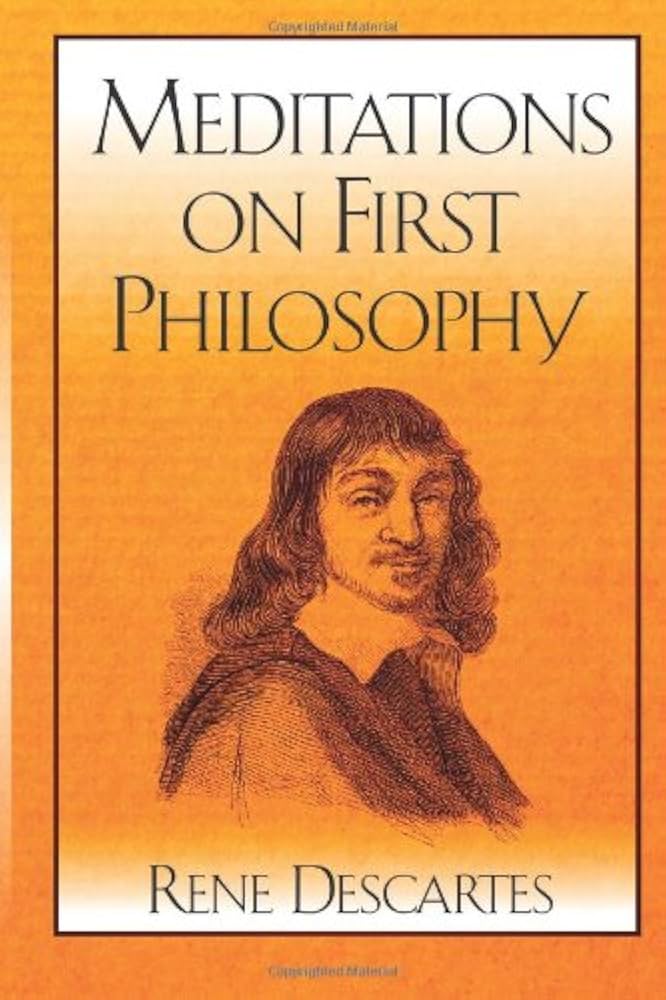Table of Contents
Doubt as a Tool of Certainty
Few texts have altered the course of Western philosophy as profoundly as René Descartes’ Meditations on First Philosophy (1641). Written in Latin and structured as six meditations, this work is not simply an argument—it is a mental exercise, an intellectual purification through radical doubt. Descartes strips away all assumptions to find a foundation so firm that it cannot be doubted: cogito, ergo sum—I think, therefore I am.
With this foundation, Descartes attempts to rebuild knowledge from the ground up, providing a rationalist blueprint that continues to shape metaphysics, epistemology, and the philosophy of mind. The Meditations are a masterclass in philosophical architecture: rigorous, introspective, and aimed at certainty in an age plagued by skepticism.
Core Themes: Doubt, Mind, and the Divine
Radical Doubt and Methodological Skepticism
The first meditation begins with a demolition: Descartes commits to doubting everything he has learned—perception, body, even mathematics. His radical skepticism is not nihilism, but a method: by doubting all that can be doubted, he hopes to uncover that which cannot.
This is not idle academic exercise; it is a foundational shift: trust only what withstands the most brutal scrutiny. This idea alone paved the way for modern philosophy’s obsession with epistemological grounding.
Cogito, Ergo Sum: The Inescapable Self
In the second meditation, Descartes finds his first certainty: even if all else is illusion, the fact that he is thinking proves his existence. This famous axiom—I think, therefore I am—is not a syllogism but a performative truth. It marks a turning point in the philosophy of selfhood, placing consciousness and reason at the center of being.
The mind, not the body, becomes the primary reality. This moment defines Descartes as the founder of modern rationalism.
Mind-Body Dualism
The separation between thinking substance (res cogitans) and extended substance (res extensa) introduces Cartesian dualism: the mind is immaterial and indivisible, while the body is material and divisible.
While influential, this dualism has sparked centuries of critique, especially in philosophy of mind and neuroscience. Nonetheless, Descartes’ framing helped formalize discussions of consciousness and subjective experience.
The Existence of God and the Problem of Error
In Meditations III–V, Descartes introduces a sequence of arguments for God’s existence, drawing on ontological and causal reasoning. A perfect being must exist because the very idea of such a being could not have originated in an imperfect mind. God becomes the guarantor of clear and distinct perceptions—reintroducing certainty into a universe Descartes has just deconstructed.
Yet, even here, Descartes confronts the “problem of error”: how can a perfect God allow us to be deceived? His answer—that error arises when will outpaces understanding—is philosophically neat, though arguably evasive.
The Foundation of Knowledge
The sixth meditation attempts to revalidate the external world, arguing that our perceptions must correspond to real objects because God is not a deceiver. The work ends not with solipsism but with a cautious return to the world, now reframed by clear and distinct perception.
Influence and Legacy
Descartes’ Meditations did not merely answer old questions—it transformed the questions themselves. His method became a template for rational inquiry. He elevated epistemology to the central concern of philosophy, influenced modern science by emphasizing mathematical clarity, and laid the groundwork for figures like Spinoza, Leibniz, Kant, and even Husserl.
In modern terms, Descartes is the father of introspective consciousness, the split between mind and matter, and the method of doubt as a tool for discovery. While his metaphysics may be contested, his method remains foundational.
Strengths and Limitations
Strengths:
- Methodological Innovation: Radical doubt as a tool for certainty remains philosophically powerful.
- Conceptual Clarity: Descartes’ structured progression makes metaphysical inquiry accessible.
- Foundational Impact: Influenced not only philosophy but science, mathematics, and psychology.
Limitations:
- Dualism’s Problems: The separation of mind and body remains contested and biologically tenuous.
- Circular Reasoning?: Critics argue his proof of God assumes what it sets out to prove.
- Theological Dependence: His reliance on God as epistemic guarantor limits secular applicability.
Who Should Read It?
- Philosophy students and scholars of epistemology and metaphysics
- Thinkers exploring the roots of subjectivity and consciousness
- Readers interested in the birth of modern rationalism
- Those seeking to understand the Cartesian legacy in Western thought
TL;DR
Meditations on First Philosophy is not just a historical artifact—it is a living method. Descartes challenges us to rethink knowledge, selfhood, and the foundations of belief. While many of his conclusions have been challenged or revised, the spirit of his inquiry remains vital.
Where Nietzsche deconstructs and Kant critiques, Descartes constructs—a cathedral of reason built atop the unshakable foundation of thought itself.

Leave a Reply